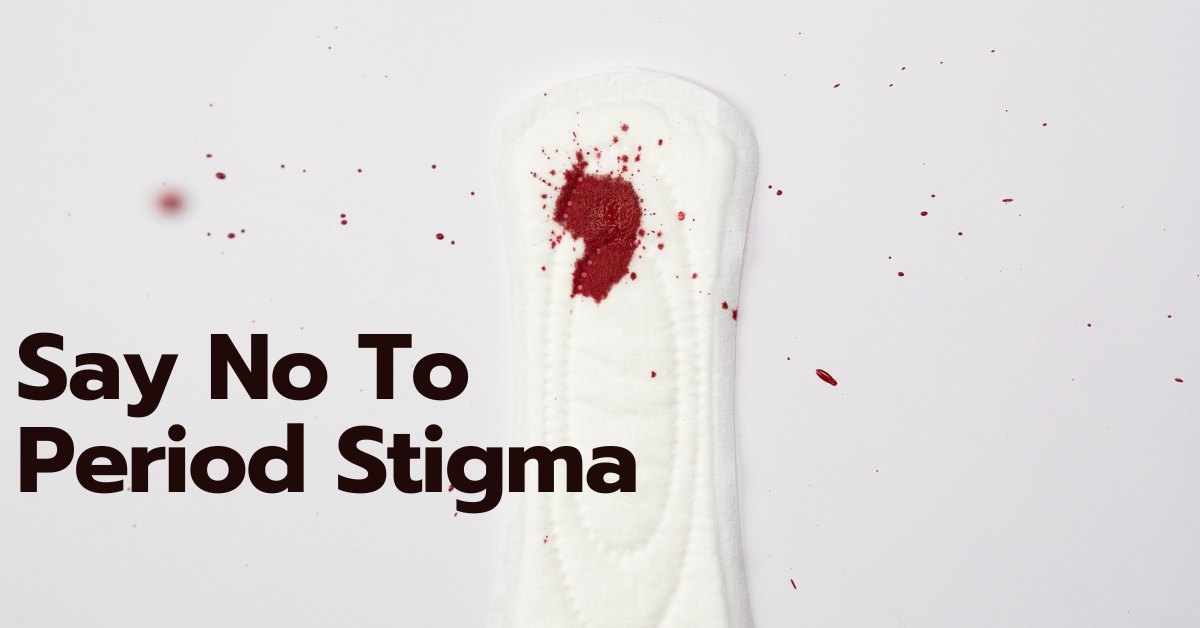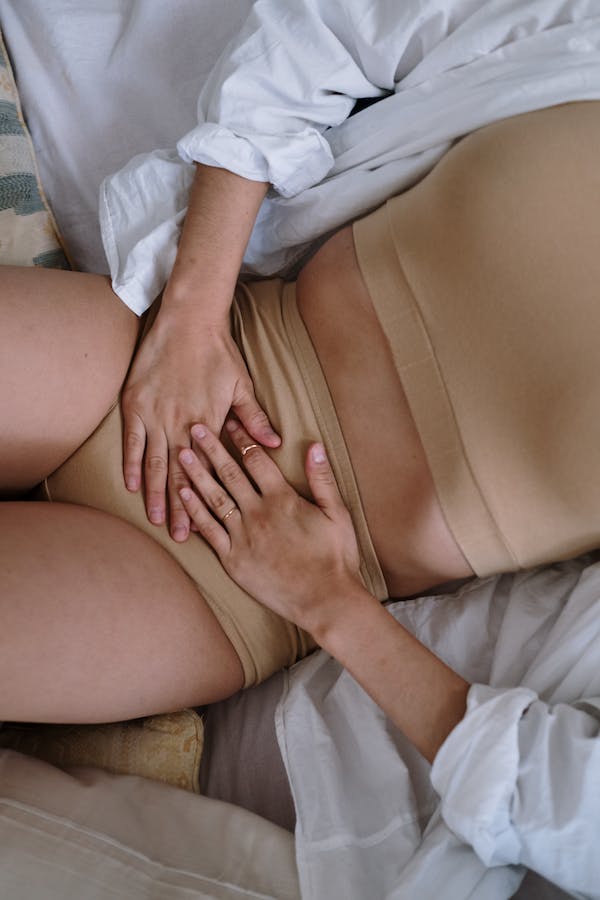Damaris Mutai
Medical Parasitologist
Medical Content Writer
Powered by Type
Period Stigma

Period stigma or menstruation stigma is a major problem that adolescent girls and women face during their menstruation or ‘That Time of the Month.’ They may feel uncomfortable or afraid to discuss being on their periods or issues affecting them while on their menstrual cycles.
A little flashback?
Issues pertaining to period stigma take me back to my primary school days- particularly when I was in Standard Eight….
Whenever our teachers and school management organized girl talk sessions with Menstrual activists or Sponsors within our locality, my girlfriends and I always giggled whenever an announcement was made during Friday assemblies.
These sessions were meant for Standard Seven and Eight pupils.
During break time, we would talk and ask questions amongst ourselves in hushed tones,
Menstruation and female reproduction talk in the afternoon, really?
Is this girl talk really necessary?
“Hata hatujaanza kuona menses zetu bado, si wanatuaibisha mbele ya our sirs and boy classmates? Nkt!”
This is loosely translated to…
“We haven’t even begun our monthly cycle yet, they are just making us feel ashamed by bringing up the topic during the assembly in the presence of our male teachers and boy classmates. Nkt!”
As I flashback, my girlfriend and I were actually already trapped in ‘The Cancer of Period Stigma’ at our tender age.
Could our society, family, or cultural taboos have ingrained menstruation myths in us?
Was it abnormal for our school to normalize menstruation hygiene and related talks then?
Honestly, I don’t know.
That is a story for another day.
Little did I know that having open discussions and communication on menstruation was vital at our adolescent stage as some of us were already on our periods or almost beginning our menstrual cycles.
These sessions were part and parcel of relaying information on menstruation and empowering us to be proud of who we are and our menstruation journeys.
In this article, we shall explore:
- Basics of menstruation
- Case Studies of period stigma in Kenya
- Causes of period stigma
Basics of menstruation
What is menstruation?
Menstruation is the periodic vaginal discharge of blood, disintegrated uterine membrane lining tissues, and other secretions at a certain time of each month. This only happens in non-pregnant girls and women following the failure of fertilization of the egg or the ovum by the sperm.
This often occurs in menarche girls and women before they reach menopause. Menarche refers to the onset of your first monthly cycle as a young girl. This may happen when you are 12 years old or it can begin even as early as 9 years old. Menstrual cycle occurrences continue until 45-55 years in a woman’s life.
Without our menstrual cycles, conception, bearing kids, and being called MOMMA, SWEET MUM, or MUMMY could just be a dream!
An interesting read: Everything You Need to Know about Toxoplasmosis
What are the phases of menstrual cycle?
Basically, the menstrual cycle begins on the first day of your menses to the first day of your next menstrual period. The average menstrual cycle lasts for 28 days in majority of the women. However, the menstrual cycle may vary from one woman to the other: 24- 38 days.
Biologically, the menstrual cycle entails 4 key phases:
Follicular/ proliferative phase
- Happens before the release of an egg from the ovary
- In women and girls with a 28-day menstrual cycle, the follicular phase starts from the first day of your period to the 14th day. Day 14 is the beginning of ovulation.
- Maturation of the ovarian follicles and the disintegration of the endometrium and subsequent menstruation are the key happenings during this stage.
- The predominant hormones are low levels of oestradiol and progesterone at the beginning of the phase.
- The high levels of follicle-stimulating hormone (FSH) also begin to decline while the estrogen levels begin to rise as the phase approaches its end
Ovulatory phase
- This is the ovulation stage whereby a mature egg is released from the dominant ovary to the fallopian tube for potential fertilization by the sperm. If you desire to get pregnant, this is the most fertile and best time for you to get lovey-dovey with your partner or spouse.
- Happens on day 14
- Its duration ranges from 16-32 hour
- Increasing levels of FSH and luteinizing hormone(LH)
- Low estradiol levels
- High progesterone levels
Luteal phase
- Happens after egg release from the ovary
- It is the time right after ovulation to your next menstrual period.
- It lasts for 14 days
- Surging levels of progesterone and estradiol hormones secreted by corpus luteum: This is vital for breast preparation for lactation
- Thickening of the uterine lining for preparation for potential pregnancy
- Disintegration of corpus luteum in the absence of pregnancy resulting in declining progesterone levels
Menstrual cycle hormones
The complex interaction of 4 gonadotrophic/sex female hormones plays an essential role in the regulation of your menstrual cycle phases. These hormones are:
Follicle-stimulating hormone (FSH)- vital in the follicular phase
Produced by the anterior pituitary gland, FSH is important in:
- Stimulating the growth of follicles in women’s ovaries prior to ovulation (egg release from the ovary)
- Enhancing the production of estradiol and inhibin B hormones
In the menstrual cycle, FSH levels are highest during ovulation and begin to fall as you start your menses. The declining FSH levels aid in preventing the maturation of the immature follicles
Luteinizing hormone (LH)- vital during luteal and follicular phases
LH is secreted by gonadotroph cells present in the anterior pituitary gland.
LH is responsible for:
- Stimulating the release of a mature egg from the ovary during ovulation.
- Stimulating the release of steroids from the ovaries
- Regulating the menstrual cycle length and order; plays a pivotal role in ovulation and egg implantation in the uterus
- Stimulating progesterone release from the corpus luteum after ovulation
- In synergy with human chorionic gonadotrophic hormone (hCG), LH promotes sexual development and functioning in both women and men.
Estradiol (E2)- Vital in the follicular and luteal phases
E2 is the predominant estrogen hormone in women’s reproductive age. It is secreted by the follicles of the ovaries and the adrenal glands. Placenta produces it during pregnancy.
Estradiol’s roles in the menstrual cycle are:
- Increasing LH levels thereby inducing ovulation
- Enhances growth, maturation, and maintenance of your female reproductive system: eggs in the ovaries, fallopian tubes, vagina, myometrium
- In conjunction with progesterone hormone, they aid in the preparation of the uterus ready for implantation after ovulation
- Pregnancy maintenance
Progesterone- vital in the luteal phase
Source- degeneration of the corpus luteum from the ruptured follicles in the ovary
Progesterone is essential in 2 scenarios:
- Pregnancy: Prepares uterine lining ready for potential implantation of a fertilized egg. Progesterone levels remain high throughout the pregnancy to ensure the survival of the developing fetus.
- Menstruation: In the absence of pregnancy, the disintegration of the corpus luteum results in a fall in progesterone levels. As a result, the uterine lining breaks down and it is expelled with blood and other materials marking the beginning of your menstrual period.
Case Studies of period stigma in Kenya
Now that we understand how menstruation occurs, let us look at the various ways in which period stigma may arise:
Cases of period stigma on Kenya women have been in the limelight in the recent past: For example, women have experienced instances of embarrassment and discrimination:
Take, for instance, the experience that our nominated Senator Gloria Orwoba attended a senate meeting in white suit pants stained with fake menstrual blood. Her act was part of her raising awareness of what girls go through while on their periods and the Free Sanitary Towels Campaign. The sentiments she received even from her fellow women senator were just beyond disheartening!
4 years ago, a 14-year-old girl committed suicide due to period shaming by her teacher. This was after she stained her school uniform during her first menstrual period.
More saddening, 2 weeks ago, A Kenyan-based Cheese Factory, The Brown’s Food Company Limited in Limuru, made headlines after their female staff were stripped naked to check if they were on their menses. The incident happened after a sanitary towel was disposed of in the wrong bin.
All these incidents indicate how women and young girls suffer from period stigma either directly or indirectly.
Causes of period stigma
The following are the key contributing factors to menstruation stigma:
Misinformation on menstrual periods
Many individuals particularly our fathers, brothers, spouses, and male counterparts may not have the right information regarding menstruation. This may make them tend not to understand us while we are on our periods: our irritability, menstrual cramps, mood swings, period pains vulnerability, and food cravings that are brought about during our periods.

Cultural taboos and discriminatory societal norms
Biblically and traditionally, menstruating women and young girls were deemed unclean or dirty while on their menses. Although this notion may have been scrapped, some cultures still hold it dear. As a result, women become embarrassed during their periods. A culture of silence also makes them not confident and proud to discuss topics pertaining to menstruation openly with their family members.
Period poverty
Inadequate or lack of menstrual hygiene management tools and resources largely contribute to period stigma.
This may arise due to financial constraints that make girls and women not to afford to buy sanitary towels. As a result, this may make school going girls miss school, engage in transactional sex/Sex for Pads, or be forced into early marriages.
In other instances, the lack of menstrual hygiene management WASH resources like toilets in public spaces may make women vulnerable to period stigma.
However,
The good news is, cases of girls missing schools due to menstruation have been on the decline following:
- Enactment of the Kenyan Menstrual Hygiene Management Policy 2019-2030
- Free distribution of sanitary towels to adolescent girls in public primary and secondary schools since 2011
- Scrapping of taxes on all menstrual products since 2004
- Rise of many menstrual activists and sponsors raising awareness on menstruation and free sanitary pads distributions
The Bottom line
As women and adolescent girls, we shouldn’t be ashamed of our menses and associated experiences. Rather, we should hold our heads high to prevent falling prey to period stigma!
Found this post insightful? Like and share.
